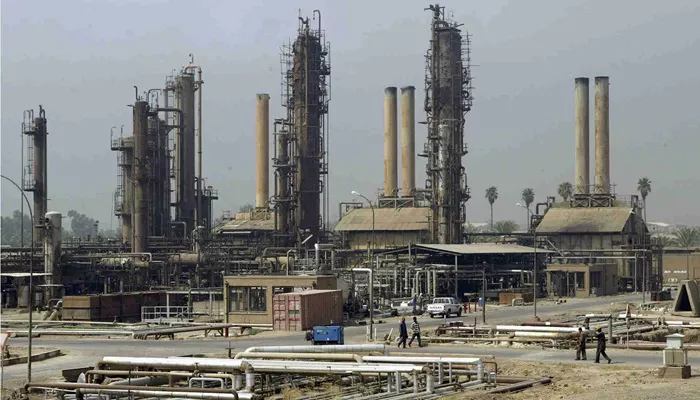Iraqi lawmakers have formally called on the government to clarify reports about plans to fund the construction of an oil refinery in Tripoli, northern Lebanon, raising concerns about the rationale behind such an initiative while domestic energy infrastructure projects continue to face delays.
According to Abdul-Sahib Hasnawi, spokesperson for Iraq’s Ministry of Oil, the ministry has no official information about the reported project. Alaa Ouda al-Nashi, a member of parliament representing the southern province of Dhi Qar, submitted a formal request to Prime Minister Mohammed Shia’ al-Sudani, expressing alarm over alleged government intentions to invest in an overseas refinery while similar projects within Iraq, particularly in her own province, remain neglected.
Al-Nashi posted a letter on her Facebook page, arguing that the Tripoli refinery plan raises several questions, particularly regarding the economic and strategic importance of completing the Dhi Qar refinery. She urged the government to clarify its priorities in energy sector investment.
Opposition Lawmaker Highlights Concerns
The issue was brought to broader public attention by opposition MP Mustafa Sanad, who claimed that the prime minister had directed officials to build a 70,000-barrel-per-day refinery in Tripoli. Sanad published a document on Facebook, purportedly from the Ministry of Oil, detailing plans to “support and assist the Lebanese people” through the project. The refinery would initially be supplied via tanker trucks or highways until a planned pipeline is completed.
According to Sanad, the proposed pipeline would extend from Iraq’s southern oil hub in Basra to Haditha, then pass through Baniyas and Homs in Syria, eventually reaching Tripoli. The document was reportedly signed on April 27, 2025. However, The New Arab (TNA) could not independently verify the authenticity of the document.
The claims surfaced just days after a high-level Lebanese delegation, including Energy Minister Walid Fayad, visited Baghdad, fueling speculation about deeper Iraq–Lebanon energy cooperation.
Government Officials Push Back
Fadi al-Shammari, the prime minister’s political adviser, denied the refinery plans in a post on social media platform X, dismissing the reports as “Hollywood-style fabrications.” He emphasized that any overseas refinery project would require approval from the Iraqi Council of Ministers and comprehensive feasibility studies—a process that could take years.
Shammari also argued that foreign refinery investments are not unprecedented, citing similar strategies by countries such as Saudi Arabia and the United States to diversify markets and maximize revenues. He questioned how such potential projects could be interpreted as “betraying Iraq.”
TNA reached out to Deputy Oil Minister Ezzat Sabir and Hibat al-Halbousi, head of the parliamentary Oil and Gas Committee, but received no response by the time of publication.
A Pipeline Revival in Context
The controversy emerges as Iraq seeks broader regional energy integration. Last month, a government delegation visited Damascus to explore the possibility of reviving a defunct oil pipeline that once carried Iraqi crude to the Mediterranean.
The Kirkuk–Baniyas pipeline, built in 1952, connected Kirkuk’s oil fields to Syria’s port of Baniyas. With a capacity of 300,000 barrels per day, it was shut down during the Iran–Iraq War and later damaged in the 2003 U.S.-led invasion. It has remained non-operational since.
Syria and Lebanon are grappling with a severe energy crisis after recent Israeli military operations devastated their oil infrastructure. Both countries now rely heavily on intermediaries for crude imports.
Tripoli’s oil installations consist of a terminal and a refinery. Under a 1931 Lebanese law, the Iraq Petroleum Company was allowed to transport crude via Syria to Tripoli for export and refining. The refinery, built in 1940 with a 21,000-barrel-per-day capacity, was nationalized in 1973 and shut down in 1992 amid civil unrest.
Today, the site imports fuel oil and diesel, storing and distributing them via private companies. It remains uncertain whether the proposed project would involve constructing a new refinery or rehabilitating the old one originally built with Iraqi support.
An Iraqi oil expert told TNA that refurbishing the old facility would be unwise and technically inefficient, calling modern refineries far more cost-effective. He added that a new refinery could still be built on the historic site, though rebuilding the Kirkuk-to-Haditha pipeline segment through Syria would require substantial time and investment due to unknown conditions in Syrian territory.
Strategic Implications and Regional Diplomacy
The expert also suggested that Iraq’s recent overtures toward Syria might be intended to pressure Turkey into reopening the Kirkuk–Ceyhan pipeline, currently halted amid political and legal disputes.
Prime Minister Sudani recently visited Turkey to discuss restarting oil exports through the port of Ceyhan. At a joint press conference, Turkish President Recep Tayyip Erdoğan expressed Ankara’s willingness to expedite the reopening process.
Baghdad has grown increasingly frustrated with Turkey’s delays. In March 2023, the International Chamber of Commerce ruled that Iraq’s federal government—not the Kurdistan Regional Government—holds exclusive rights over oil exports. Following the decision, Turkey halted the export of 450,000 barrels per day from the Kurdish region and was ordered to pay Iraq $1.5 billion in damages for previous unauthorized exports.
For Iraq, reopening the Syrian export route offers an alternative corridor and a valuable geopolitical bargaining chip as it seeks to diversify export options beyond its southern ports and manage potential Gulf tensions.
Whether driven by aspirations for regional connectivity or geopolitical leverage, the Tripoli refinery proposal underscores a broader strategic recalibration in Iraq’s oil export policy—one that, as Iraqi lawmakers point out, must strike a careful balance between domestic development priorities and expanding foreign ambitions.
Related Topics:
Oil Prices Steady on US-China Trade Hopes
U.S.-China Trade Hopes and Supply Outlook Drive Oil Prices Up

